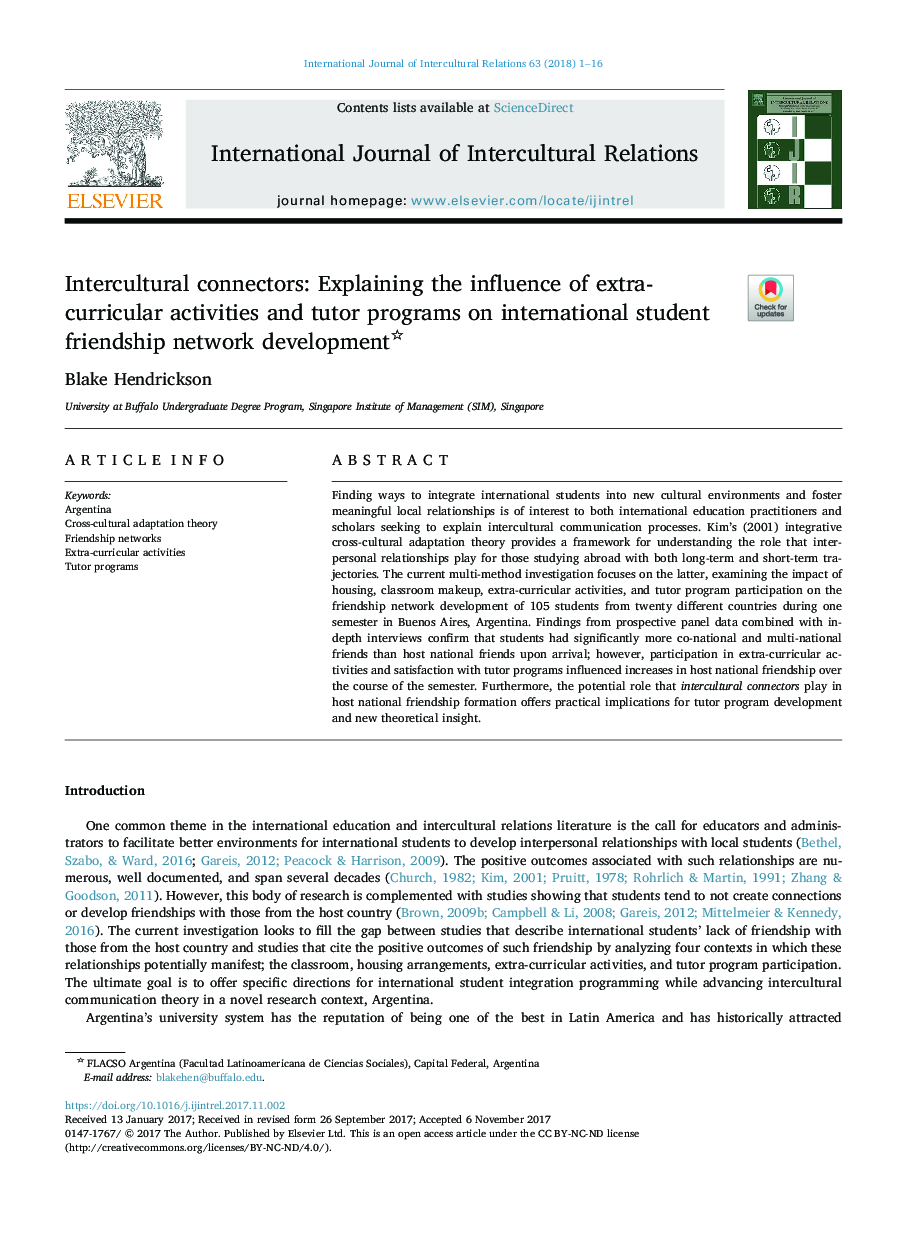| کد مقاله | کد نشریه | سال انتشار | مقاله انگلیسی | نسخه تمام متن |
|---|---|---|---|---|
| 7323630 | 1475727 | 2018 | 16 صفحه PDF | دانلود رایگان |
عنوان انگلیسی مقاله ISI
Intercultural connectors: Explaining the influence of extra-curricular activities and tutor programs on international student friendship network development
ترجمه فارسی عنوان
کانکتور های بین فرهنگی: توضیح تاثیر فعالیت های برنامه درسی و برنامه های آموزشی در توسعه شبکه دوستی دانشجویی بین المللی
دانلود مقاله + سفارش ترجمه
دانلود مقاله ISI انگلیسی
رایگان برای ایرانیان
کلمات کلیدی
آرژانتین، تئوری سازگاری متقابل فرهنگی، شبکه های دوستیابی فعالیت های فوق برنامه، برنامه های آموزشی
ترجمه چکیده
پیدا کردن راه هایی برای ادغام دانش آموزان بین المللی به محیط های فرهنگی جدید و ایجاد روابط معنی دار محلی، برای علاقه مندان به آموزش و پرورش بین المللی و محققان به دنبال تعریف فرایندهای ارتباطات بین فرهنگی است. کیم (2001) تئوری سازگاری متقابل فرهنگی یکپارچه فراهم می کند چارچوبی برای درک نقش که روابط بین فردی برای کسانی که در خارج از کشور با هر دو مسیر طولانی مدت و کوتاه مدت بازی می کنند. تحقیقات چند مرحله ای کنونی بر روی دومین تاثیر می گذارد، در بررسی تاثیر مسکن، آرایش کلاس درس، فعالیت های غیر برنامه درسی و مشارکت برنامه آموزگار در توسعه شبکه دوستی 105 دانشجوی از بیست کشور مختلف در طی یک ترم در بوینس آیرس، آرژانتین. یافته های حاصل از داده های پانل فوری با مصاحبه های عمیق نشان می دهد که دانش آموزان پس از ورود، به طور قابل توجهی بیشتر از دوستان و همکاران داخلی و ملی خود از دوستان میزبان ملی برخوردار بودند. با این حال، مشارکت در فعالیت های فوق برنامه و رضایت از برنامه های معلم بر افزایش دوستی میزبان ملی در دوره ترم تاثیر گذاشت. علاوه بر این، نقش بالقوهی که کانکتورهای بین فرهنگی در شکل دادن دوستی میزبان ملی بازی می کنند، مفاهیم عملی را برای توسعه برنامه معلم و بینش جدید نظری ارائه می دهد.
موضوعات مرتبط
علوم انسانی و اجتماعی
مدیریت، کسب و کار و حسابداری
کسب و کار و مدیریت بین المللی
چکیده انگلیسی
Finding ways to integrate international students into new cultural environments and foster meaningful local relationships is of interest to both international education practitioners and scholars seeking to explain intercultural communication processes. Kim's (2001) integrative cross-cultural adaptation theory provides a framework for understanding the role that interpersonal relationships play for those studying abroad with both long-term and short-term trajectories. The current multi-method investigation focuses on the latter, examining the impact of housing, classroom makeup, extra-curricular activities, and tutor program participation on the friendship network development of 105 students from twenty different countries during one semester in Buenos Aires, Argentina. Findings from prospective panel data combined with in-depth interviews confirm that students had significantly more co-national and multi-national friends than host national friends upon arrival; however, participation in extra-curricular activities and satisfaction with tutor programs influenced increases in host national friendship over the course of the semester. Furthermore, the potential role that intercultural connectors play in host national friendship formation offers practical implications for tutor program development and new theoretical insight.
ناشر
Database: Elsevier - ScienceDirect (ساینس دایرکت)
Journal: International Journal of Intercultural Relations - Volume 63, March 2018, Pages 1-16
Journal: International Journal of Intercultural Relations - Volume 63, March 2018, Pages 1-16
نویسندگان
Blake Hendrickson,
